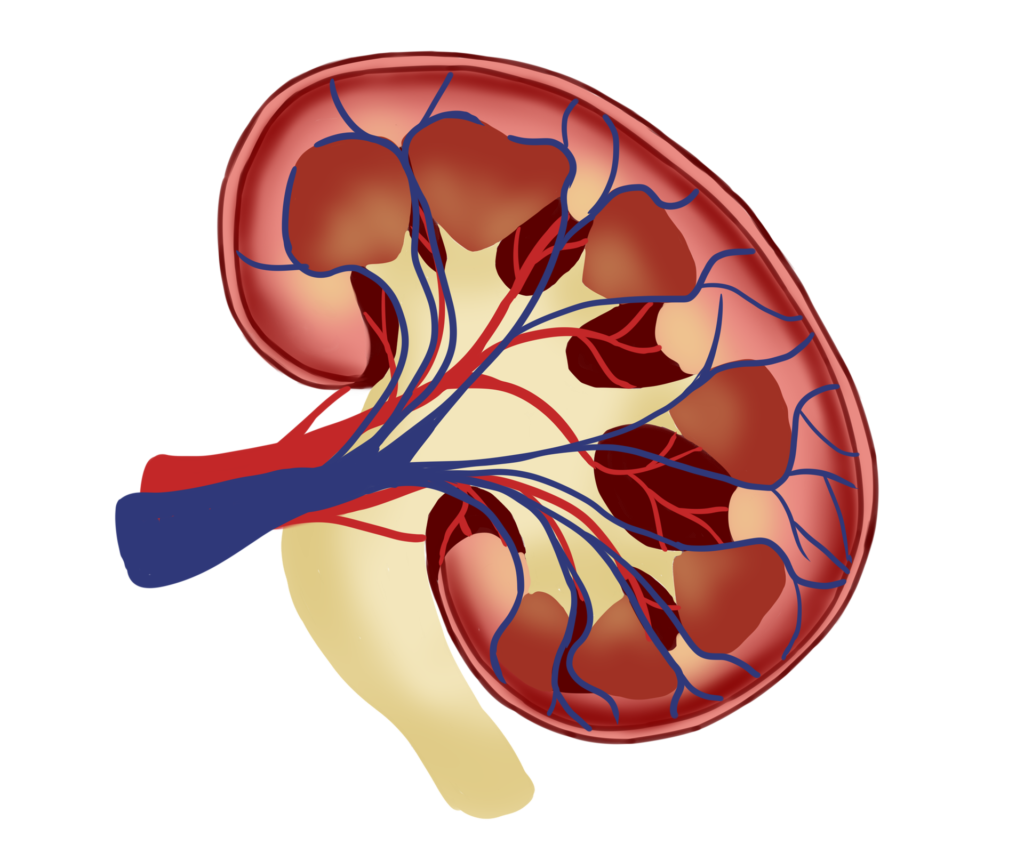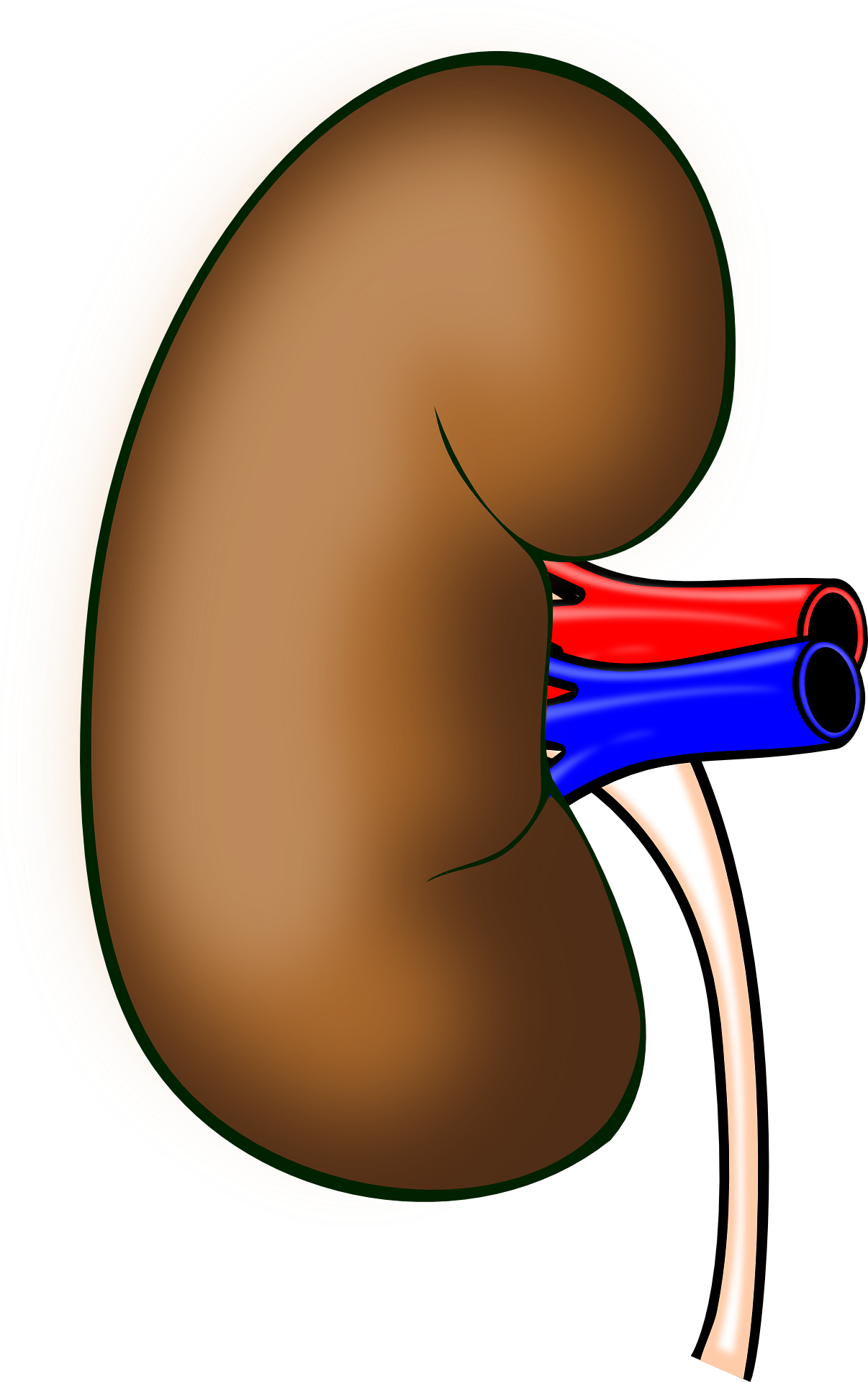Kidney

Today we are going to talk about a serious disease, which is kidney failure. Our kidneys are a very important organ in our body, which is responsible for cleaning the blood and removing waste products through urine. When the kidneys stop functioning properly, the body begins to accumulate waste, which can be very dangerous to health.
What is kidney failure?
This is a condition in which your kidneys gradually or suddenly stop working to clean blood. There are two main types:
- Acute Kidney Failure : This occurs suddenly and can develop over a few days or weeks. Sometimes treatment even helps the kidney recover.
- Chronic Kidney Failure – It develops slowly over years. In this case, kidney function is permanently impaired and may require dialysis or a kidney transplant as treatment.
Why does kidney non function occur?
There are many reasons why kidney non function can occur, some of the main ones being:
- Diabetes: Sugar is a major cause of kidney failure. If blood sugar is not under control for a long time, the blood vessels in the kidneys are damaged.
- High Blood Pressure: High blood pressure can also damage the blood vessels in the kidneys.
- Glomerulonephritis : This is an inflammatory disease of the kidneys that damages the filtering unit (glomeruli) of the kidneys.
- Polycystic Kidney Disease : This is a genetic disease in which multiple cysts (cysts) form in the kidney and kidney function gradually decreases.
- Urinary tract obstruction : If the urinary tract becomes obstructed due to stones or any other reason, urine can flow back into the kidneys and damage the kidneys.
- Certain medications : Certain painkillers and antibiotics (antibiotics) can cause kidney damage if taken for a long time.
- Dehydration: Acute kidney failure can also be caused by a lack of water in the body.
- Infection: Even serious infections can damage the kidneys.
Non function Kidney symptoms
In the early stages of low kidney function , many times there are no significant symptoms. When kidney function is severely reduced, these symptoms may appear:
- Tiredness and weakness – The accumulation of impurities in the blood leads to feeling tired and weak.
- Swelling : The accumulation of excess water and salt in the body can cause swelling of the feet, ankles, and face.
- Changes in urine : Less urination, excessive nighttime urination, blood in urine or change in color of urine.
- Breathing difficulty : Excessive water accumulation in the lungs can cause breathing difficulties.
- Vomiting and nausea: The accumulation of impurities in the blood can cause vomiting and nausea.
- Itching : The accumulation of waste in the body can cause itching of the skin.
- Loss of appetite : Appetite decreases and weight loss occurs.
- Trouble in Sleep : May have difficulty in sleeping.
- Muscle spasms : An imbalance of electrolytes (electrolytes) in the body can cause muscle spasms.
Non Function Kidney diagnosis
There are a variety of tests doctors can do to diagnose its failure:
- Physical Examination : The doctor will perform a physical examination and ask about your symptoms.
- Blood test : The level of creatinine (creatinine) and urea (urea) in the blood is checked. These are waste products that build up in the blood if the kidneys can’t clear them properly.
- Urine test : The urine is tested for protein, blood and other abnormal substances.
- Imaging Test : Ultrasound, CT scan or MRI (MRI) can be used to see the size and texture of the kidney.
- Kidney Biopsy : In some cases, a small piece of the kidney is removed and sent for testing to determine the exact cause of the kidney damage.
- GFR (GFR – Glomerular Filtration Rate) Test: This test shows how well your kidneys are cleaning blood.
Treatment of low function kidney
Treatment for this depends on the type and severity of the disease:
- Treatment of Acute Kidney : Its treatment depends on the cause. Doctors try to restore kidney function with medications, fluids and sometimes dialysis for a short period of time.
- Treatment of Chronic Kidney Failure : There is no cure for chronic kidney failure, but treatment can kill the disease
- Medicines : Medicines are given to control blood pressure, remove anemia (lack of blood), strengthen bones and maintain the balance of electrolytes in the body.
- Dialysis : This is a process that removes waste products and excess water from the blood when the kidneys are unable to do this on their own. There are two main types of dialysis:
- Hemodialysis : In this, the blood is cleaned with the help of a machine.
- Peritoneal Dialysis : It uses the lining of the stomach (peritoneum) as a filter.
- Kidney Transplant : It is the best treatment for chronic kidney failure. In this, a healthy donor’s kidney is transplanted into the patient.
Kidney Failure Prevention
Here are some important things to keep in mind to prevent kidney failure:
- Keep diabetes and high blood pressure under control : If you have diabetes or high blood pressure, take medicines regularly as advised by your doctor and keep your blood sugar and blood pressure under control.
- Have a healthy diet : Eat a balanced diet that is low in salt, protein and fat.
- Exercise regularly : Exercise for at least 30 minutes every day.
- Drink enough water : Drink plenty of water throughout the day to keep the kidneys functioning properly.
- Use painkillers sparingly : Do not take painkillers for a long time without a doctor’s advice.
- Get checked regularly: If you are at risk of kidney damage, get checked regularly by a doctor.
- Quit Smoking : Smoking is harmful to the entire body, including the kidneys.
Conclusion
Kidney failure is a serious condition, but with the right information and precautions, the risk can be reduced. It is very important to recognize the early symptoms and seek timely treatment. You can keep your kidneys healthy by adopting a healthy lifestyle and following your doctor’s advice.
Kidney Failure: Frequently Asked Questions
Question 1: What causes kidney failure?
Answer: Kidney failure is a condition where your kidneys are not able to clean the blood properly. It can occur gradually (chronic) or suddenly (acute).
Question 2: Why does kidney failure occur?
Answer: There are many reasons why kidney failure can occur, such as diabetes, high blood pressure, inflammation of the kidneys (glomerulonephritis), polycystic kidney disease, urinary tract obstruction, certain medications, dehydration (dehydration), and infections.
Question 3: What are the main symptoms of kidney failure?
Answer: There may be no symptoms in the early stages, but later there may be fatigue, weakness, swelling (in the legs, ankles, face), changes in urination (more or less flow, bleeding), shortness of breath, vomiting, nausea, itching, loss of appetite, and trouble sleeping.
Question 4: How is kidney failure detected?
Answer: Kidney failure is detected by blood tests (creatinine, urea), urine tests, imaging tests (ultrasound, CT scan, MRI), and kidney biopsy. The GFR (GFR) test also measures kidney function.
Question 5: How is kidney failure treated?
Answer: Treatment for acute kidney failure depends on the cause and sometimes the kidneys recover. There is no cure for chronic kidney failure, but the disease can be controlled with medications, dialysis (hemodialysis or peritoneal dialysis), and a kidney transplant.
Question 6: What is dialysis?
Answer: Dialysis is a process that removes waste products and excess water from the blood when the kidneys are not functioning properly. There are two main types: hemodialysis (cleaning the blood with a machine) and peritoneal dialysis (using the lining of the stomach).
Question 7: What is a kidney transplant?
Answer: A kidney transplant is an operation in which a kidney from a healthy donor (donor) is implanted into a patient. It is the best treatment for chronic kidney failure.
Question 8: How to prevent kidney failure?
Answer: To prevent kidney failure, keep diabetes and high blood pressure under control, eat a healthy diet, exercise regularly, drink enough water, use painkillers sparingly, and get regular checkups. Quit smoking too.
Question 9: Can kidney failure be cured?
Answer: Acute kidney failure can sometimes be cured with treatment. But chronic kidney failure is usually not curable, but treatment can slow its progress and control symptoms.
Question 10: What should people with kidney failure avoid?
Answer: People with kidney failure should reduce their salt, potassium, phosphorus, and fluid (water) intake. Protein should also be taken only on the advice of a doctor. Avoidance may be different for each patient.
Question 11: What could be the early warning signs of kidney failure?
Answer: Early signs may be very mild such as excessive fatigue, slight changes in urinary habits, or mild swelling. Therefore, it is important to consult a doctor if you notice any unusual changes.
Question 12: What is the life expectancy for people with kidney failure?
Answer: The life expectancy of people with kidney failure depends on their health, treatment (dialysis or transplant), and other diseases. People who receive treatment can live longer.
Question 13: Does stress affect kidney failure?
Answer: Direct stress is not the cause of kidney failure, but long-term stress can raise blood pressure, which can damage the kidneys. So stress reduction is important for health.
Question 14: Is exercise necessary for people with kidney failure?
Answer: Yes, light exercise can be beneficial when advised by a doctor. It helps to keep the body strong and reduce fatigue. But avoid high-intensity exercise.
Question 15: How much does it cost to treat kidney failure?
Answer: The cost of treating kidney failure can be very high due to treatments such as dialysis and transplant. It depends on the type of treatment, the hospital, and the city.
